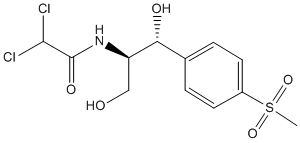All AbMole products are for research use only, cannot be used for human consumption.

Thiamphenicol (Thiophenicol) is an antimicrobial antibiotic and a methyl-sulfonyl analogue of chloramphenicol. Thiamphenicol (Thiophenicol) has a similar antibacterial spectrum to chloramphenicol. Thiamphenicol (Thiophenicol) inhibits protein synthesis in bacteria. Thiamphenicol (Thiophenicol) has a bacteriostatic action against a broad range of microorganisms, although it may be bactericidal for some species under some conditions, and in concentrations 3 to 5 times higher than the bacteriostatic concentrations. Thiamphenicol (Thiophenicol) is particularly used for the treatment of sexually transmitted infections and pelvic inflammatory disease.
| Molecular Weight | 356.22 |
| Formula | C12H15Cl2NO5S |
| CAS Number | 15318-45-3 |
| Form | Solid |
| Solubility (25°C) | DMSO |
| Storage |
Powder -20°C 3 years ; 4°C 2 years In solvent -80°C 6 months ; -20°C 1 month |
[1] Kai Yang, et al. Removal of antibiotic thiamphenicol by bacterium Aeromonas hydrophila HS01
[3] Marta Tikhomirov, et al. Pharmacokinetics of florfenicol and thiamphenicol in ducks
| Related Antibiotic Products |
|---|
| Puromycin-d3
Puromycin-d3 is the deuterium labeled Puromycin. Puromycin dihydrochloride is the dihydrochloride salt of puromycin. Puromycin is an aminoglycoside antibiotic that inhibits protein synthesis. |
| BSH-IN-1
BSH-IN-1 is a potent and covalent inhibitor of gut bacterial recombinant bile salt hydrolases (BSHs) with IC50s of 108 nM and 427 nM for B. longum BSH (Gram positive) and B. theta BSH (Gram negative), respectively. |
| AAA-10
AAA-10 is an orally active gut bacterial bile salt hydrolases (BSH) inhibitor, with IC50s of 10 nM, 80 nM against B. theta rBSH and B. longum rBSH respectively. |
| Gut restricted-7
Gut restricted-7 (GR-7) is a potent, covalent and orally active pan-bile salt hydrolase (BSH) inhibitor. Gut restricted-7 has a tissue-selective and is restricted to the gut. Gut restricted-7 decreases gut bacterial BSHs and decreases deconjugated bile acid levels in feces of mice. |
| N-Hydroxypipecolic acid
N-Hydroxypipecolic acid (1-Hydroxy-2-piperidinecarboxylic acid), a plant metabolite and a systemic acquired resistance (SAR) regulator, orchestrates SAR establishment in concert with the immune signal salicylic acid. N-Hydroxypipecolic acid accumulates systemically in the plant foliage in response to pathogen attack. N-Hydroxypipecolic acid induces SAR to bacterial and oomycete infection. |
All AbMole products are for research use only, cannot be used for human consumption or veterinary use. We do not provide products or services to individuals. Please comply with the intended use and do not use AbMole products for any other purpose.


Products are for research use only. Not for human use. We do not sell to patients.
© Copyright 2010-2024 AbMole BioScience. All Rights Reserved.
